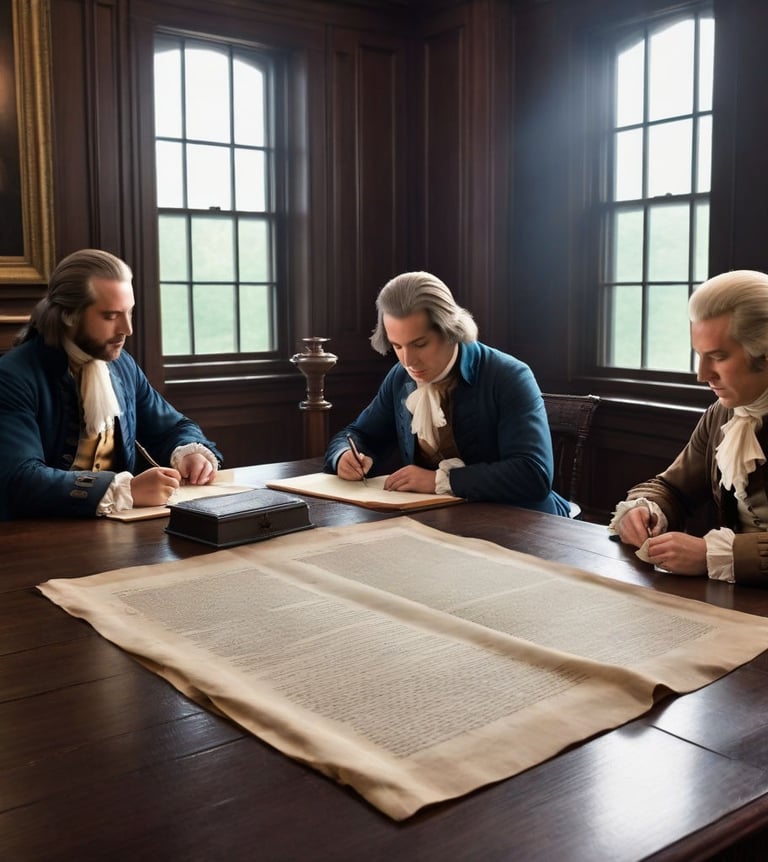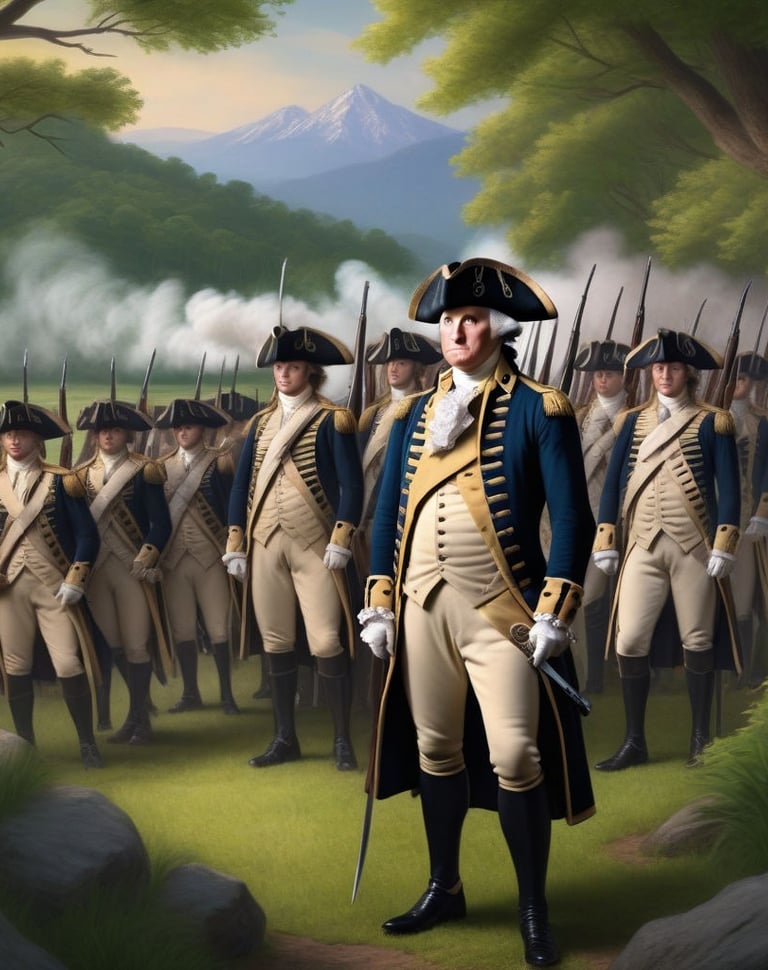The Declaration of Independence and the Founding Fathers
What drove the American colonies to break away and form a new nation? Uncover the profound journey behind the Declaration of Independence, marking a pivotal moment in American history. Learn about the origins, significance, and the visionary Founding Fathers, who dared to envision a nation founded on liberty, equality, and democracy.
HISTORICAL FIGURESHISTORIC EVENTS
Michael Keller
6/28/20246 min read


Independence Day: The Declaration of Independence and the Founding Fathers of the United States
Have you ever wondered what it took to declare independence from one of the world's most powerful empires? The Declaration of Independence, adopted on July 4, 1776 [1], was not just a bold statement but a monumental step that laid the foundation for the United States of America. Take a look into the origins, significance, and key figures behind this historic document. We will explore the lives and contributions of the Founding Fathers, the circumstances surrounding the Declaration, and how it continues to impact the world today.
Setting the Stage for Independence
The mid-18th century was a time of great tension between the American colonies and the British Crown. Increasingly oppressive policies and taxes imposed by Britain, such as the Stamp Act and the Townshend Acts [2], fueled growing discontent among colonists. The desire for self-governance and economic freedom became the rallying cries for a burgeoning revolutionary movement. But what exactly pushed these individuals to risk everything for independence? The final straw came with the Intolerable Acts of 1774 [3], which aimed to punish Massachusetts for the Boston Tea Party and suppress colonial resistance. The colonies responded by convening the First Continental Congress, where representatives debated their response to British aggression. As conflict escalated into open warfare in April 1775 with the battles of Lexington and Concord, the need for a unified statement of independence became clear.


The Drafting of the Declaration
The Second Continental Congress, convened in May 1775, took up the cause. A year later, on June 11, 1776, a committee was appointed to draft a formal declaration. This committee included Thomas Jefferson, John Adams, Benjamin Franklin, Roger Sherman, and Robert R. Livingston. Jefferson, known for his eloquent writing, was tasked with drafting the document [4]. Jefferson's initial draft was a powerful indictment of King George III's tyranny, listing grievances that justified the colonies' break from Britain. His words were poignant and compelling, capturing the spirit of the revolution. One of the most memorable lines from the Declaration reads: "A Prince whose character is thus marked by every act which may define a Tyrant, is unfit to be the ruler of a free people". This quote encapsulated the colonists' view of the British monarch and their resolve for self-determination.
The Declaration's Adoption and Significance
After some revisions and heated debates, the Continental Congress adopted the Declaration of Independence on July 4, 1776 [1]. Fifty-six delegates signed this historic document, risking their lives and fortunes for the cause of freedom. This bold act marked the birth of a new nation founded on the principles of liberty, equality, and democracy. Interestingly, not all key figures of the revolution were present to sign the Declaration. George Washington, for instance, was with his troops in New York, preparing the Continental Army for imminent battle with British forces [6]. His absence underscores the multifaceted struggle for independence, where military and political efforts were both crucial.


The Founding Fathers: Architects of a Nation
The Founding Fathers were a diverse group of leaders, each contributing uniquely to the birth of the United States. Let's take a closer look at some of these pivotal figures:
Thomas Jefferson
Jefferson, the principle author of the Declaration, was a fervent advocate for liberty and a visionary statesman. His writings laid the intellectual foundation for American independence and governance. Jefferson's dedication to the principles of freedom and equality left an indelible mark on the nation's character.
Benjamin Franklin
Franklin was a polymath whose diplomatic skills were instrumental in securing French support for the American cause [5]. His wisdom, wit, and scientific contributions made him a revered figure both in America and abroad. Franklin's presence in the Continental Congress added gravitas to the revolutionary effort.
John Adams
Adams was a fierce advocate for independence and played a key role in persuading others to support the cause. His legal expertise and passionate oratory were crucial in the debates leading up to the adoption of the Declaration. Adams later became the second President of the United States, continuing to shape the young nation.
George Washington
Although not a signer of the Declaration, Washington's leadership was vital to the success of the American Revolution. As the commander-in-chief of the Continental Army, he led his troops through adversity to eventual victory [6]. Washington's legacy as the "Father of His Country" is a testament to his enduring impact on American history.
Alexander Hamilton
Hamilton's contributions extended beyond the battlefield; he was a key figure in shaping the nation's financial system and government structure [7]. His advocacy for a strong central government and his role in writing the Federalist Papers were pivotal in the ratification of the Constitution.
John Jay
John Jay was a statesman and diplomat who played a critical role in the formation of the United States. As one of the authors of The Federalist Papers, along with Hamilton and Madison, Jay helped to promote the ratification of the Constitution. He was also the first Chief Justice of the United States Supreme Court, where he established important judicial precedents. Jay's diplomatic efforts were instrumental in negotiating the Treaty of Paris, which ended the Revolutionary War and secured American independence.
James Madison
James Madison is often hailed as the "Father of the Constitution" for his pivotal role in drafting and promoting the U.S. Constitution and the Bill of Rights [8]. His deep understanding of political theory and commitment to a balanced government helped shape the nation's foundational legal framework. Madison also co-authored The Federalist Papers, which were essential in securing the Constitution's ratification. As the fourth President of the United States, Madison continued to influence the young republic's development, particularly through his leadership during the War of 1812.


The Declaration's Legacy
The Declaration of Independence is more than a historical document; it is a timeless statement of human rights and aspirations. Its assertion that "all men are created equal" and endowed with "unalienable Rights" has inspired countless movements for justice and equality worldwide.
Conclusion
The Declaration of Independence was a bold proclamation that changed the course of history. It was the product of courageous individuals who dared to envision a world where liberty and justice prevailed. Their legacy endures, reminding us of the enduring power of freedom and the responsibilities it entails.
As we reflect on the birth of the United States, let us also consider how the principles of the Declaration continue to resonate today. How can we honor the vision of the Founding Fathers in our own time? What steps can we take to ensure that liberty and justice remain cornerstones of our society?
We invite you to share your thoughts. For feedback or inquiries, email us at contact@archivinghistory.com. We look forward to hearing from you!
Join Archiving History as we journey through time! Want to stay-tuned for our next thrilling post? Subscribe!
Follow us on Facebook, Instagram, and TikTok for captivating insights, engaging content, and a deeper dive into the fascinating world of history. Just click here!
Source(s):
[1] United States, The Declaration of Independence (Philadelphia, 1776).
[2] Merrill Jensen, The Founding of a Nation: A History of the American Revolution, 1763-1776 (New York: Oxford University Press, 2004), 23-45.
[3] Peter Thomas, Tea Party to Independence: The Third Phase of the American Revolution, 1773-1776 (New York: Oxford University Press, 1991), 123-145.
[4] Thomas Jefferson, The Papers of Thomas Jefferson, vol. 1, 1760-1776 (Princeton, NJ: Princeton University Press, 1950), 123-145.
[5] Benjamin Franklin, The Papers of Benjamin Franklin, vol. 1, 1760-1776 (New Haven, CT: Yale University Press, 1959), 123-145.
[6] George Washington, The Papers of George Washington, vol. 1, 1760-1776 (Charlottesville, VA: University of Virginia Press, 1981), 123-145.
[7] Alexander Hamilton, The Papers of Alexander Hamilton, vol. 1, 1760-1776 (New York: Columbia University Press, 1961), 123-145.
[8] James Madison, The Papers of James Madison, vol. 1, 1760-1776 (Chicago: University of Chicago Press, 1962), 123-145.

